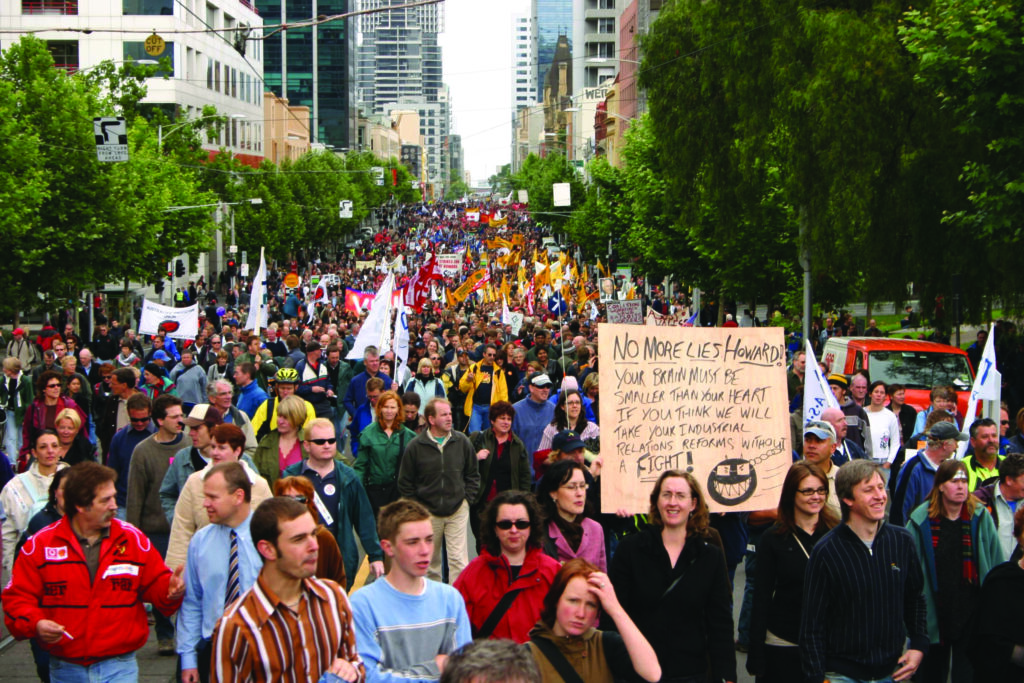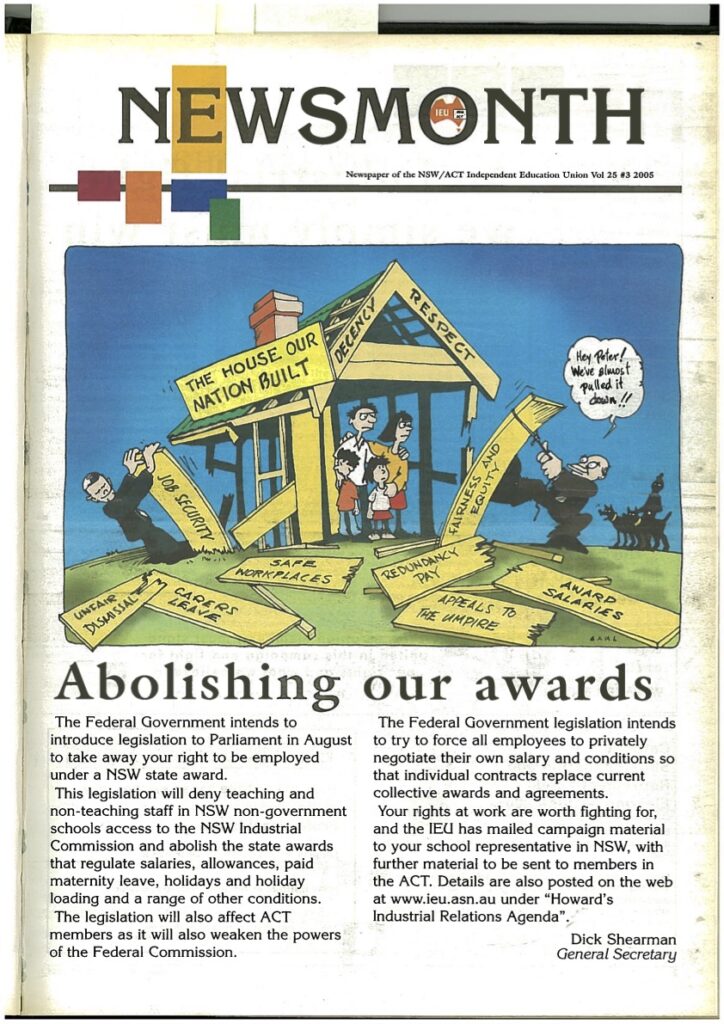Prime Minister John Howard was at the height of his power in 2005 after his government attained a majority in the Senate following the previous year’s federal election.
However, 2005 marked the beginning of the end of the federal Coalition government after it introduced draconian industrial relations legislation.
Dubbed WorkChoices, it sought to severely restrict working conditions that could be regulated by awards, promote individual contracts over collective agreements, cut unfair dismissal protections and reduce the federal Industrial Relations Commission’s power to arbitrate disputes.
The Howard government attained a majority in the Senate on 1 July 2005, giving it the power to pass the legislation.
Union mobilises against Work Choices

On the same day, IEU members participated in a stop work meeting, gathering in almost 200 pubs and clubs around the state with workers from every industry and profession in a ‘Sky Channel meeting’ – what we did before video conferencing platforms such as Zoom and Teams.
A second nationwide Sky Channel union meeting was held on 15 November. There were 263 meetings in locations throughout NSW and the ACT alone. Unions NSW described the link-up as “the largest ever meeting of workers in NSW”.
Almost 600 new members joined the IEU in the weeks prior to the 1 July meeting.
More people joined the IEU as awareness grew of the inherent unfairness of WorkChoices and its impact on their working lives. IEU membership exceeded 27,000 by year’s end. Of the 3188 members who joined in 2005, 649 remain members today – they should have received or will receive certificates marking their 20-year milestone this year.
Many employers, including the Catholic and Uniting churches, expressed concerns about the excesses of WorkChoices, while other employers tried to reduce worker power. Lismore was the first Catholic diocese to offer individual contracts in NSW after winning a tender for a federal government Australian Technical College.
The Howard government’s attack on working people mobilised unions to mount the Your Rights at Work campaign.
“We will campaign for as long and as hard as it takes to overturn these laws and anyone who thinks that out campaign will fade away had better think again,” then ACTU Secretary Greg Combet said at a Melbourne rally.
Radical education reforms
Federal education minister Brendon Nelson in 2005 outlined his agenda, which included the following proposals:
- implementation of an Australian Certificate of Education as the key year 12 exit certificate
- ‘plain English’ A to E reporting guidelines for all students to commence from 2006
- literacy and numeracy tests to be reported to parents against national standards – NAPLAN was introduced in 2008
- making ‘school performance’ publicly available – the My School website was launched in 2010
- a values education program that included a requirement for all schools to fly the Australian flag – the government used Commonwealth funding as a lever to ensure schools complied with their program
- inquiries into teacher education
Newly elected Queensland LNP politician Andrew Laming called for teacher pay to be based on student improvements against national benchmarks. Teacher blaming, if not teacher bashing, was again in vogue.
NSW Premier Bob Carr did himself no favours in the eyes of IEU members by supporting much of the federal government’s education agenda. Morris Iemma became premier in August following Carr’s retirement as the second longest serving premier of NSW.
Teacher training
The NSW Institute of Teachers, now absorbed into the NSW Education Standards Authority (NESA), had it’s first full year of operation in 2005.
At first, only newly employed teachers (new-scheme teachers) were required to be accredited; that is, to “demonstrate professional competency”.
The IEU advocated for employers to provide support and resources for new-scheme teachers, their supervisors and mentors.
Reports emerged that the accreditation process was being weaponised in some non-government schools as means to subject teachers to disciplinary processes.
Outside the classroom
Professor Fiona Wood, a plastic surgeon who pioneered the ‘spray-on skin’ technique, which greatly reduces permanent scarring in burn victims, was named the 2005 Australian of the Year.
Union Aid Abroad (APHEDA) ran an appeal in 2005 to support victims of the Boxing Day Tsunami.
Comedian and talk show host Rove McManus won the Gold Logie for most popular personality on Australian TV, while Chris Hemsworth from Home and Away was voted Most Popular New Male Talent. McLeod’s Daughters was Australian TV’s most popular drama series.
Missy Higgins won the 2005 ARIA Album of the Year for The Sound of White, and Ben Lee won Single of the Year with the infectious Catch My Disease.
Cate Blanchett won an Oscar for best supporting actress for The Aviator, while Million Dollar Baby was awarded Best Picture in 2005.
Wests Tigers took out the 2005 NRL premiership, while the Sydney Swans defeated the West Coast Eagles to claim the Blood’s first premiership in 72 years.
From the archives – Howard’s “WorkChoices”
The IEU issued a warning about the federal government’s industrial relations agenda in early 2005 with the headline: ‘Howard’s revolutionary agenda’.
In the second issue of the year, IEU General Secretary Dick Shearman spelt out the dangers for members.
“The government intends to dismantle an industrial framework that has existed for more than 100 years,” he said.
Howard’s WorkChoices legislation aimed to shift industrial matters from the state to the federal government and demolish valuable protections.
Shearman summed up the Howard government’s agenda as an attempt to “shift bargaining power to employers in a way that can only be described as revolutionary, given its effective abolition of fairness from our industrial processes”.
The IEU set up a section on its website called “Howard’s IR Agenda” to provide members with regular updates.

The third issue of Newsmonth featured the headline “Abolishing our awards”, accompanied by a cartoon showing the dismantling of “the house our nation built”.
Job security, unfair dismissal, carer’s leave, appeals to the umpire and award salaries were all at risk.
“The federal government legislation intends to try to force all employees to privately negotiate their own salary and conditions so that individual contracts replace current collective awards and agreements,” Shearman wrote.
In the next issue, members were invited to take part in “Australia’s largest ever workers’ meeting – Say NO to the Federal government’s attack on your rights at work”.
In other news, a “Welcome to new staffers” article included one Dave Towson, now our Deputy Secretary, keen to join the fight. Organiser Kendall Warren was also featured with a “first day on the job” grin.
In 2005, working conditions that members considered “normal” were under threat. Rights we take for granted today were under attack. They will always need defending.
Published in the June 2025 edition of Newsmonth. Compiled by Dave Towson (Deputy Secretary), Monica Crouch (Managing Editor) and Tania Yardley.
More IEU History
-
Time capsule: 2015
In 2015, former US President Barack Obama still occupied the White House. The Lodge in Canberra, however, had new tenants after Malcolm Turnbull successfully challenged…
-
Time capsule: 1985
They’re probably not two people you’d expect to see in the same sentence, but the year was 1985, and China’s leader Deng Xiaoping was the…
-
Time capsule: 2005
Prime Minister John Howard was at the height of his power in 2005 after his government attained a majority in the Senate following the previous…
-
Time capsule 1995
In a semi-regular column, we delve into our Newsmonth archives to uncover what stood out in the union, the teaching profession and the education sector, as well…
-
Statement on the passing of John Quessy
The IEU is deeply saddened by the passing of former Secretary John Quessy on Sunday 10 December. John joined the Independent Teachers Association (now the…
-
Time capsule 1981
In a semi-regular column, we delve into our Newsmonth archives to uncover what stood out in the union, the teaching profession and the education sector, as well…






